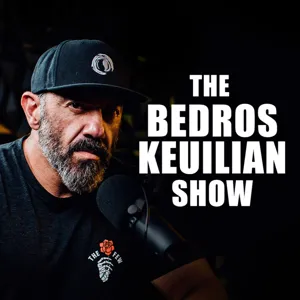Podcast Summary
The relationship between economic conditions and mortality rates may not be as straightforward as we think: Economic booms might not always lead to better health outcomes, and some studies even suggest that death rates can increase during economic booms. Factors like lifestyle behaviors and access to healthcare may contribute to this counterintuitive finding.
The relationship between economic conditions and mortality rates may not be as straightforward as we might assume. While it's commonly believed that economic booms are good for our health and recessions are bad, economist Chris Roome's research challenges this assumption. In fact, some studies suggest that death rates can actually increase during economic booms. This counterintuitive finding may be due to a variety of factors, including changes in lifestyle behaviors and access to healthcare. It's important to remember that intuition alone may not always provide a complete picture of complex economic phenomena. Instead, we must be open to new evidence and perspectives, even if they go against our initial assumptions. So the next time you hear someone making sweeping statements about the relationship between the economy and health, remember that the truth is often more nuanced than it seems.
Economic prosperity doesn't always mean fewer deaths: Despite common belief, deaths often rise during economic growth, except for traffic fatalities which decrease during recessions.
Contrary to common belief, overall deaths tend to increase when the economy is doing well, rather than decreasing. This finding, which has been replicated in various countries and time periods using more sophisticated statistical techniques, challenges the popular notion that economic downturns lead to increased mortality. However, there is an exception to this trend: traffic fatalities, which decrease significantly during economic recessions due to reduced driving. This counterintuitive result underscores the complex relationship between economic conditions and mortality rates.
Decrease in deaths during economic recessions: During economic recessions, deaths from car crashes and cardiovascular diseases tend to decrease, possibly due to decreased pollution levels and increased leisure time.
During economic recessions, both the number of car crash deaths and cardiovascular disease deaths tend to decrease. This counterintuitive finding is consistent across various studies, and while the reasons are not fully understood, some theories suggest that decreased pollution levels and increased leisure time due to job loss or reduced work hours may contribute to these trends. The decrease in deaths from major sources of mortality, including cardiovascular disease, is a common occurrence during economic downturns. However, it's important to note that the mechanisms behind these trends are not completely clear, and further research is needed to fully understand the complex relationship between economic conditions and mortality rates.
Economic recessions can have unexpected effects on health: During economic downturns, overall deaths decrease but suicides and drug poisoning increase, indicating people may be healthier but not happier. It's essential to find ways to support those facing economic hardships for better health outcomes.
During economic recessions, deaths overall tend to decrease, but there are exceptions such as suicides and drug poisoning deaths which increase. This might suggest that people are healthier during tough economic times, but not necessarily happier. It's important to note that this doesn't mean recessions are a good thing, but rather an unexpected finding regarding health trends. The reason for this could be due to people prioritizing work too much or having to work multiple jobs with irregular hours, leading to negative health consequences for some. Therefore, it's crucial to consider how we can improve alternatives for those facing economic hardships to promote better overall health and well-being.
Economic downturns' impact on mortality rates lessens in US: Research shows that while deaths typically decrease during economic declines, the effect might not be as significant as before, possibly due to the opioid crisis.
The relationship between economic downturns and mortality rates has lessened in the US over the past few decades. Researcher Chris Roome explained that while it's still true that deaths generally decrease during economic declines, the impact might not be as significant as it once was. One possible reason for this trend is the opioid crisis. As for Roome's personal life, he's working on making changes based on his research but acknowledges it's a work in progress. Overall, the conversation highlighted the complex connection between economic conditions and health outcomes. This episode was produced by NPR and sponsored by Saatva and Mint Mobile. For more on this topic, follow The Indicator.



 Steven Blumberg serves as vice president, practice transformation, for GuideWell Health. In this role, he is responsible for developing and implementing strategies for the further establishment of a high-quality, economically effective clinical system across Florida. He also provides guidance on value-based care and population health models.
Steven Blumberg serves as vice president, practice transformation, for GuideWell Health. In this role, he is responsible for developing and implementing strategies for the further establishment of a high-quality, economically effective clinical system across Florida. He also provides guidance on value-based care and population health models.
 Loren Adler is associate director of the USC-Brookings Schaeffer Initiative for Health Policy. His research focuses on a range of topics in health care economics and policy, including provider payment and consolidation, insurance markets, Medicare, the Affordable Care Act, prescription drugs, and COVID-19 testing. Previously, he served as research director for the Committee for a Responsible Federal Budget and as a senior economic policy analyst for the Bipartisan Policy Center.
Loren Adler is associate director of the USC-Brookings Schaeffer Initiative for Health Policy. His research focuses on a range of topics in health care economics and policy, including provider payment and consolidation, insurance markets, Medicare, the Affordable Care Act, prescription drugs, and COVID-19 testing. Previously, he served as research director for the Committee for a Responsible Federal Budget and as a senior economic policy analyst for the Bipartisan Policy Center.
